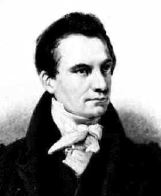

Since Charles Babbage's father was fairly wealthy, he could afford to have Babbage educated at private schools. He was sent to an academy at Forty Hill, Enfield, Middlesex where his education properly began. He began to show a passion for mathematics. On
leaving the academy, he continued to study at home, having an Oxford tutor to bring him up to university level. Babbage entered Trinity College, Cambridge in 1810.
He set up the Analytical Society in 1812, and its members were all Cambridge undergraduates. Nine mathematicians attended the first meeting. Babbage and Herschel produced the first of the publications of the Analytical Society in 1813. They published a remarkably deep history of the calculus for undergraduates. Two further publications of the Analytical Society were the joint work of Babbage, Herschel and Peacock.
Babbage moved from Trinity College to Peterhouse and it was from that College that he graduated with a B.A. in 1814. Babbage married in 1814, then left Cambridge in 1815 to live in London. He wrote 2 major papers on functional equations in 1815 and 1816. Also in 1816, at the early age of 24, he was elected a fellow of the Royal Society of London. He
wrote papers on several different mathematical topics over the next few years but none are particularly important and some, such as his work on infinite series, are clearly incorrect.
In 1820 he was elected a fellow of the Royal Society of Edinburgh, and in the same year he was a major influence in founding the Royal Astronomical Society. He served as secretary to the Royal Astronomical Society for the first 4 years of its existence and later he served as
vice-president of the Society.
Babbage, together with Herschel, conducted some experiments on magnetism in 1825. In 1827 Babbage became Lucasian Professor of Mathematics at Cambridge, a position he held for 12 years, although he never taught. The reason why he held this prestigious post and
yet failed to carry out the duties was that by this time he had become engrossed in what was to became the main passion of his life, namely the development of mechanical computers.
Babbage is without doubt the originator of the concepts behind the present day computer. He was motivated by logarithm tables to attempt to construct tables using the method of differences by mechanical means. Such a machine would be able to carry
out complex operations using only the mechanism for addition. Babbage began to construct a small difference engine in 1819, and had completed it by 1822. He announced his invention in a paper read to the Royal Astronomical Society in 1822. Babbage illustrated what his small engine was capable of doing by calculating successive terms of the sequence n2 + n + 41, though an assistant had to write down the terms obtained. In 1823, Babbage received a gold medal from the Astronomical Society for his development of the difference engine. He received a grant to begin work on a larger difference engine.
In 1830, Babbage published a controversial work that resulted in the formation of the
British Association for the Advancement of Science. In 1834, Babbage published his most influential work On the Economy of Machinery and Manufactures, in which he proposed an early form of what today we call operational research.
After spending 17000 pounds on the construction of the new difference engine, including 6000 pounds of his own money, he gave up in 1834. By this time, he had completed the first drawings of the analytical engine, the forerunner of the modern electronic computer. Although the analytic engine never progressed beyond detailed drawings, it is remarkably similar in
logical components to a present day computer.
Although Babbage never built an operational, mechanical computer, his design concepts have been proved correct. After Babbage's death a committee was appointed by the British Association to report upon the feasibility of the design. Recently such a computer has been
built following Babbage's own design criteria. The construction of modern computers, logically similar to Babbage's design, have changed the whole of mathematics and it is
even not an exaggeration to say that they have changed the whole world.